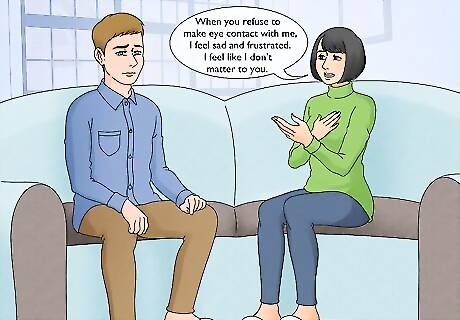
views
Stay calm.

Resist the urge to lash out or “punish” your partner. When you act on your feelings instead of explaining them, your SO may feel less safe about opening up to you. If you feel yourself losing your cool next time your partner acts distant, take a few slow, deep breaths. You may need to step away for a little while and get your feelings under control before talking to them. Remind yourself that their behavior is about them, not you. When someone acts emotionally unavailable, it’s typically a defense mechanism to help them deal with uncomfortable feelings.
Tell your partner how you are feeling.

Use “I” language so that they don’t feel attacked. If your SO is acting distant or shutting you out, calmly explain how this behavior makes you feel. Don’t make any demands or try to force them to open up—just tell them what you’re experiencing. For instance, “When you refuse to make eye contact with me, I feel sad and frustrated. I feel like I don’t matter to you.” Avoid making statements that attack your partner as a person or make it seem like they’re at fault for your own reactions. For example, don’t say things like, “You always act so cold! You’re driving me crazy!”
Own up to your part in the relationship dynamic.

Take an honest look at your own behavior. Try putting yourself in your partner’s shoes. Ask yourself if anything you’re doing might be triggering your partner to go into “defense mode.” For instance, do you tend to interrupt them or tune them out when they’re speaking? Do you lash out or become overly critical when they do something you don’t like? If so, acknowledge it—both to yourself and to them. Let them know that you recognize the problem and are willing to work on changing your own behavior. For instance, say something like, “I know that sometimes I lash out when I feel criticized. But I want you to be able to open up to me when something’s bothering you, so I’m going to work on being better about that.” This can be extremely tough to do. You’re probably feeling very hurt by your partner’s behavior, which is totally understandable! But being empathetic and owning your part in things is a huge step towards helping your partner feel more secure and less defensive.
Explain your needs and expectations clearly.

Your partner might not understand what you want from them. No matter how obvious it might seem to you, remember that they can’t read your mind. Make a specific, gentle request expressing what you want them to do differently. For example, you could try saying, “Next time you’re angry with me, could you please tell me how you’re feeling and what’s bothering you?” Or, “I know you’re upset, but it would mean a lot to me if you would look at me or acknowledge me verbally when I talk to you.”
Ask how you can make them more comfortable.

If possible, do this at a time when you’re both calm and relaxed. In a non-judgmental way, acknowledge that your SO has a tendency to shut down when they’re unhappy with you. Talk to them about what you can do when that happens to make communication easier and put them more at ease. For instance, say something like, “Sometimes when you’re stressed, I’ve noticed that you kind of check out and don’t want to talk. What’s the best way for me to talk to you when that happens?” Make an effort to really listen and understand your partner’s response. You could even try rephrasing what they say in your own words. For instance, “Okay, it sounds like you get quiet because you’re worried about losing your temper and yelling, and you just need a few minutes to yourself to calm down. Is that right?”
Create strong boundaries.

Be gentle, but clarify that intentional stonewalling isn’t acceptable. If your loved one regularly deals with problems in the relationship by freezing you out, calmly explain that you’re not going to engage with them if they act this way. Set some specific consequences and be consistent about following through. For example, you might say something like, “Okay, if you’re not willing to talk to me, I’m going to go out for a while. It’s too difficult for me to be around you when you’re acting like this.”
Set a good example with your own behavior.

Compassion is contagious—and so is responsiveness. Studies show that people who make an effort to be compassionate, open, and responsive to their partners report higher satisfaction in their relationships. As frustrated as you may be with your SO right now, do your best to treat them the way you’d want to be treated. Be attentive to their needs do your best to approach them with compassion and empathy. Whenever your partner opens up to you or behaves in responsive way, acknowledge and reward that behavior! For instance, say something like, “It means so much to me that you shared that with me,” or “I’m so glad we were able to sit down and talk about this.” Expert Answer Q How can I improve my conversation with my partner? Allen Wagner, MFT, MA Allen Wagner, MFT, MA Marriage & Family Therapist Allen Wagner is a licensed marriage and family therapist based in Los Angeles, California. He received his Master's in Psychology from Pepperdine University in 2004. He specializes in working with individuals and couples on ways they can improve their relationships. Along with his wife, Talia Wagner, he's the author of Married Roommates. Allen Wagner, MFT, MA EXPERT ADVICE Answer from Allen Wagner, MFT, MA: Tailor your conversations to match your current situation! For instance, if you're both out walking the dog, you wouldn't want to discuss something that's really detail-oriented.
Look for other ways to connect.

Some people are more naturally open and affectionate than others. Sometimes distant or unemotional behavior is a reaction to negative feelings in a relationship. In other cases, though, your partner may simply not express affection the same way you do. Consider whether your SO may be uncomfortable verbalizing their emotions. If so, you can focus on trying to understand (and speak) their “love language.” For instance, they may prefer to express or receive intimacy by: Spending quality time with you. Performing or receiving acts of service. Giving or receiving gifts. Expressing affection physically (e.g., through hugs, handholding, backrubs, or sexual intimacy). Do activities and play games together, this allows more communication and social interaction between the two of you
Be patient with your partner and yourself.

Don’t try to rush your partner or force them to respond. At the same time, give yourself a break if you lose your cool sometimes. It will take a lot of time and work—on both your parts—to change the way you interact with each other. Give your partner time and space to process their feelings, and offer gentle reminders from time to time about your needs and expectations.
Practice self-care.

Dealing with an unresponsive partner is incredibly difficult. In fact, the stress of constant stonewalling from a romantic partner can actually have an impact on your physical health. When you’re feeling upset or overwhelmed because of your SO’s behavior, take time to relax and do things that you enjoy independently of them. For example, you might: Go for a walk Eat a healthy snack Take a relaxing bath or shower Call a friend or family member to chat or vent Work on a hobby or creative project Meditate Do light stretches or yoga
See a therapist if you’re not making progress.

You and your partner may both benefit from an outside perspective. If you feel like things aren’t getting better, or like the situation is so tense between you that nothing works, talk to your SO about seeing a counselor with you. If they won’t go, consider going by yourself. A therapist can help you develop stronger coping skills and give you advice about how to deal with your partner’s behavior—or even help you decide whether it’s time to end the relationship. If you’re not sure how to find a therapist, talk to your doctor. They may be able to recommend someone who has experience with relationship issues. Stonewalling or unresponsiveness can be extremely damaging in a relationship. If your partner does it intentionally to hurt or manipulate you, then this is a form of abusive behavior. It’s very important for them to recognize the issue and be willing to work on it.



















Comments
0 comment